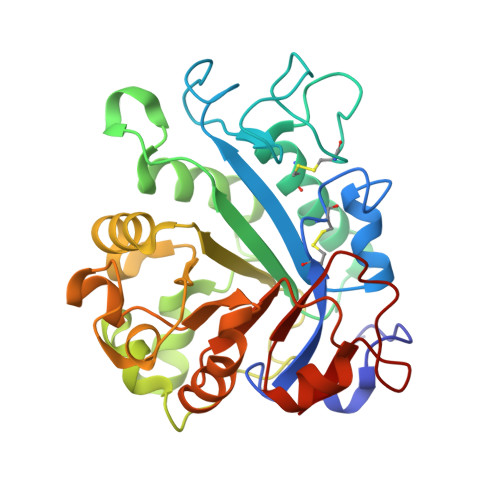The structure of a calcium-dependent phosphoinositide-specific phospholipase C from Pseudomonas sp. 62186, the first from a Gram-negative bacterium.
Moroz, O.V., Blagova, E., Lebedev, A.A., Nrgaard, A., Segura, D.R., Blicher, T.H., Brask, J., Wilson, K.S.(2017) Acta Crystallogr D Struct Biol 73: 32-44
- PubMed: 28045383
- DOI: https://doi.org/10.1107/S2059798316019616
- Primary Citation of Related Structures:
5FYO, 5FYP, 5FYR - PubMed Abstract:
Bacterial phosphoinositide-specific phospholipases C (PI-PLCs) are the smallest members of the PI-PLC family, which includes much larger mammalian enzymes responsible for signal transduction as well as enzymes from protozoan parasites, yeast and plants. Eukaryotic PI-PLCs have calcium in the active site, but this is absent in the known structures of Gram-positive bacteria, where its role is instead played by arginine. In addition to their use in a number of industrial applications, the bacterial enzymes attract special interest because they can serve as convenient models of the catalytic domains of eukaryotic enzymes for in vitro activity studies. Here, the structure of a PI-PLC from Pseudomonas sp. 62186 is reported, the first from a Gram-negative bacterium and the first of a native bacterial PI-PLC with calcium present in the active site. Solution of the structure posed particular problems owing to the low sequence identity of available homologous structures. Its dependence on calcium for catalysis makes this enzyme a better model for studies of the mammalian PI-PLCs than the previously used calcium-independent bacterial PI-PLCs.
Organizational Affiliation:
York Structural Biology Laboratory, Department of Chemistry, University of York, York YO10 5DD, England.
















